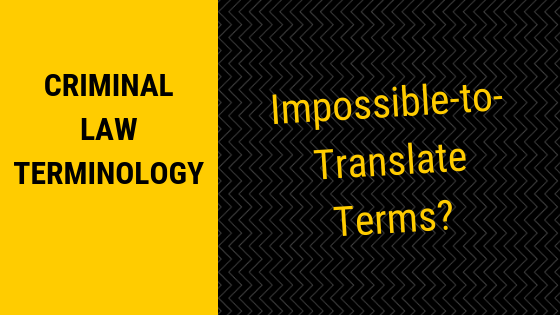
Alevosía appears as one of the basic agravantes (“aggravating circumstances” that may increase criminal liability) in the penal codes of Spain and other Spanish-speaking jurisdictions. It has been translated variously as “treachery,” “perfidy” and “malice aforethought,” none of which really reflects the true meaning of the term. “Treachery” is defined in the Oxford Online Dictionary as “betrayal of trust” or “the quality of being deceptive,” while “perfidy” is the “state of being deceitful and untrustworthy.” “Malice aforethought” is a criminal law term denoting “the requisite mental state for common-law murder” (Black’s Law Dictionary, 7th ed.).
But do any of these three terms express the meaning of alevosía? Article 22.1 of the Spanish Código Penal affirms that hay alevosía cuando el culpable comete cualquiera de los delitos contra las personas empleando en la ejecución medios, modos o formas que tiendan directa o especialmente a asegurarla, sin el riesgo que para su persona pudiera proceder de la defensa por parte del ofendido.
Thus alevosía implies committing a crime in a manner that prevents the victim from defending himself, ensuring both its consummation and that the perpetrator remains unharmed. Given this definition, instead of “treachery,” “perfidy” or “malice aforethought,” alevosía may perhaps be more accurately translated as “calculated impunity.”
Rebecca,
I beg to disagree with you; whereas your explanation of the concept is correct, your proposed translation is not quite accurate, as “impunity” implies “freedom from punishment” and the perpetrator who acts with alevosía is still subject to the additional punishment contemplated by law as an aggravating circumstance. My choice of words will be “lying in wait,” “undue advantage,” “ambush,” “trap” or something along those lines, as it appears in my Spanish-English dictionary of Mexican legal terminology.
Regards,
Javier.
LikeLike
Hi, Javier,
I think you may have misunderstood my explanation/translation. As the definition implies, when acting with alevosía the perpetrator is attempting to achieve impunity for his actions in the sense of using means that ensure the perpetration of the offense (asegurar la consumación del delito) while at the same time freeing himself from any resistance on the part of the victim and ensuring that he himself remains unharmed (asegurar la incolumnidad del agresor). And obviously, as you indicate, if the perpetrator is convicted, this agravante will likely result in an increased sentence. This is not a simple concept and there may be a better translation for alevosía, but to my way of thinking the translations you provide reflect different ways (medios) in which the perpetrator may act con alevosía, (i.e., with calculated impunity, on his part), rather than a rendering of the concept itself. In that regard, after offering a definition of alevosía similar to the one I include above, Spanish Criminal Law textbooks then give examples of acts that may be considered to have been committed con alevosía. These include ataques precedidos de emboscadas, apostamiento o acecho (attacks preceded by ambushes, lying in wait or stalking) and ataques por sorpresa o por la espalda (surprise attacks or attacks from behind). Your definitions (“lying in wait,” “undue advantage,” “ambush,” “trap”) are likewise examples of some of the ways in which an offense may be consummated con alevosía, but I’m not sure that they provide a comprehensive definition of the concept itself. But as indicated above, there may not be a simple rendering in this case.
LikeLike
Rebecca,
The concept is rather simple: willfully surprising or placing the victim in ambush so as to frustrate any attempt by the victim to defend him or herself or to avoid injury being inflicted on the perpetrator. Thus, it has nothing to do with “impunity” as you suggested.
Javier
LikeLike
Javier,
The definition you have given here for alevosía is perfect. Now, is there an English translation that would express this (rather than just repeating the definition)? That is what I was seeking when indicating that when a person commits a crime con alevosía he is seeking impunity for himself. (Perhaps rather than “impunity”, the idea is closer to “incolumnidad,” but I am still seeking a decent equivalent in English for the term.) But the “lying in wait,” “ambush,” “stalking,” etc. definitions often presented for alevosía are examples of the measures that a perpetrator may take when acting con alevosía and not a comprehensive definition of the concept itself.
LikeLike
It occurs to me that our conflicting interpretations here may arise from the different definitions of impunidad and “impunity.” In Spanish (DRAE) impune is defined as que queda sin castigo. But looking at dictionary definitions of “impunity” in English, you will see that the term has an additional meaning. “Impunity” not only means “exemption from punishment” as in Spanish, but it also has the additional meaning of “immunity from detrimental effects, as of an action” (Dictionary.com); “freedom from harm or loss” (Merriam-Webster); “freedom from the injurious consequences of an action” (Oxford) and “freedom from any risk of being punished for doing something wrong” (MacMillan), etc. This is what I mean when suggesting that when acting with alevosía a person is acting with “calculated impunity,” i.e., when committing the crime he is likewise seeking to avoid any harm to himself.
LikeLike